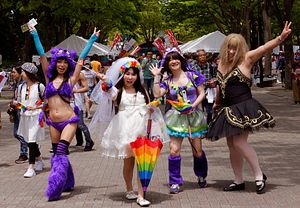On Monday, Ochanomizu Women’s University in Tokyo made national headlines with plans to open its doors to transgender students who identify as women. Until recently, enrollment for Women’s University was limited to female students who could prove their gender from their family register — an unchangeable document confirming one’s sex after birth.
Last month, a university internal working group was launched to discuss specific countermeasures and a commencement date for the intake of transgender students which is anticipated for April 2020. But the university is remaining tight-lipped on the details until an on campus press conference next week.
As Japan’s oldest women’s university, the move is a bold statement in a country that lags behind other developed nations in legally recognizing and protecting LGBT rights. While Japan doesn’t have any laws protecting gender and sexual minorities, the major hurdle remains how to pragmatically standardize incoming transgender students who identify as women but don’t have certification or haven’t had gender reassignment surgery.
In 2015 the Ministry of Education urged local school boards to do more to help transgender students integrate into all aspects of school life while an anti bullying prevention policy was revised adding LGBT specifications in 2017. Since the Education Ministry’s first LGBT overhaul three years ago, Ochanomizu University is considered the first national tertiary institution to execute the landmark move, proving attitudes are slowly shifting in a country with a one-size-fits-all approach to learning.
East of Osaka, similar measures are being considered by Nara Women’s University. Vice President Hidemi Ogawa says they will also take the lead in preparing an environment for transgender students but will need to carefully build consensus on an intake and on the preparations needed for new incoming students. Ogawa vowed to take on the challenge of bringing about “positive and forward facing consideration.”
The Tokyo municipal government launched an “LGBT friendly Tokyo” campaign this year to stamp out hate speech and gender discrimination as it prepares to host the 2020 Olympic and Paralympic Games. Tokyo Mayor Yuriko Koike pledged an anti LGBT discrimination ordinance, but with no foundation to start from, the campaign is starting from square one explaining the pros and cons of the ordinance to quell public anxiety and garner public support.
Meanwhile, municipal governments are gearing up to accommodate the needs of LGBT residents ahead of any existing laws taking it upon themselves to grant certificates of recognition to same sex couples. In 2015 the inner city Shibuya ward in Tokyo was the first local government in Japan to recognize same sex partnerships, making it easier for couples to secure housing bias free and emergency medical and hospital rights. This month, Osaka joined the list of big cities to issue same sex certification starting from July, while Nagasaki city announced plans in June for a LGBT recognition system.
The wave of growing acceptance has also extended to secondary schools which have introduced LGBT inclusive uniform options. On the outskirts of Tokyo, a high school in Chiba adopted gender neutral uniforms allowing all students to wear trousers which were traditionally designated only for male students. The decision is being commended by the Human Rights Council as a way to protect LGBT youth and kick starting a conversation on education and LGBT rights as well.

































